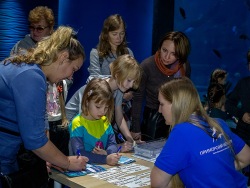#PROmariculture: Primorsky Aquarium celebrates science

Every year the Primorsky Aquarium celebrates Russian Science Day, and every year we make a timely science topic the theme of the celebration. This year the focus of the event was on mariculture – marine farming – that sparked great interest in the public and attracted lots of visitors. This decision is deliberate because this branch of aquaculture is very significant for the Russian Far East, and the expertise support provided by scientists is opening up new possibilities for marine farming.
The highlight of the celebration was a series of popular science talks entitled #PROmariculture where the speakers shared their knowledge of mariculture.
Biologist Sergey Maslennikov told the audience that sea food was not only beneficial to our health but also deserved to be called superfood, and mariculture was more environmentally friendly than other kinds of agriculture. Businessman Vasiliy Grebennikov spoke about his story as an owner of an aquaculture facility and explained how to set up a marine farm. Our aquarist Evgenia Morozova, in a professional and entertaining way, shared her experience in rearing ornamental tropical fishes and told the visitors about achievements of Aquarium’s biologists in culturing aquatic animals for the facility’s exhibits. The talks given by the lecturers drew keen interest and many questions from the audience.
A Be Mari-cultured! series of education stations taught the visitors about the challenges that salmon face and asked some tricky questions, for instance: “Why people grow seaweeds?”, “Why the sea cucumber is called ‘sea ginseng’?” and “Where does gold caviar come from?”
Moreover, the event invited our guests to undertake a guided tour covering the history of aquaculture in Russia, to enjoy a science show featuring the life cycle of sea urchins and to participate in a Colourful Tsunami art workshop.
“It was very inspiring to have so many visitors at the event devoted to such an uncommon topic!”, said Lyubov Gliznutsa, Lead Specialist of the Education Department. “We were telling about the ins and outs of mariculture and about its importance in our lives to as many guests as we could. Through all these activities, we tried to convey to our visitors the idea that, as coastal dwellers, we MUST be mari-cultured! And I’m sure that we’ve reached the goal!”